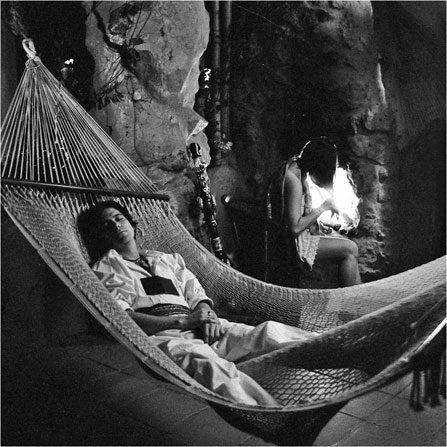
New York City
Verve Forecast
If the title of the first Brazilian Girls long player, Brazilian Girls, stood as a concise way of describing the band’s sound, the new record, New York City works in the same way. The first record is smooth and danceable, the sound of the sated contentment one would feel on the flight home after a spring break trip to Rio during Carnaval. New York City is the sound of the melting pot at work, mixing cultures, styles, sensibilities and rhythms into a new whole, while retaining the grime on the sidewalks and the non-homogenized nature of all the different ethnic neighborhoods.
Brazilian Girls eschew the International Ethno-Musicological Graduate Studies version of La Música Del Mundo popular with the recent crop of sweater-vested yacht club house bands in favor of a polyrhymical chase-scene soundtrack. Imagine Lizzy Mercier Descloux fronting Stereolab produced by Björk and outfitted by Grace Jones. At times intensely entrancing, like “Mano de Dios,” and others soaked through with dancefloor sweat, like “Losing Myself,” this is not merely faddish disco-punk with the requisite Hot Girl plopped in front of a session band anymore. Singer Sabina Sciubba seamlessly melds an armful of languages on top of Didi Gutman’s keyboards and Aaron Johnston’s drums, both of which reach as far stylistically as they are grounded in New York club funk. Not quite jumbled gibberish like Nostradamus, Sciubba’s lyrical blending of Germanic and Romance languages, often within the same line, aims the focus towards the melody rather than the meaning. This is not to say her words should be lost in translation, but perhaps taken as sarcastically esoteric, like in “Noveau Americain” (“It’s not my fault I’m a Noveau Americain”). New York City is a moody labyrinth, but this record works like a local, skillfully leading you through all the most interesting neighborhoods. From the Moog buzz boogie all the way to the mind-bending circus sound, Brazilian Girls manage not to make any wrong turns.
Michael P. O’Shaughnessy

Conor Oberst
Merge
The back-story involved with Conor Oberst’s first solo album in 13 years never bothers to mention whether this is a casual side-stepping, rec-room romp or a soul-searching diatribe floating his name around like a generational Dylan. As if it really matters. Calling it solo is a lie, as Bright Eyes have been the most ego-driven indie “band” of the last decade. Still Oberst has earned the right to toy with ambiguous intentions and artistic aloofness (on the cover he naps in a hammock). Secondly, this isn’t Oberst alone with a swap-meet bought acoustic, slumming under a harvest moon (well, during the strongest moments, maybe). Here he recruits the Mystic Valley Band to follow his whim down Mexico way for a retreat full of unadulterated hoedowns, and the results are mixed between hokey honky-tonk rave-ups and stark mid-career (?) crises.
Cleansing himself of Cassadaga’s conceptual bloat seems to be the primary intention of Oberst on this record. “Cape Canaveral,” still Florida-themed, has the desperate warble and troubadour folk that informs Oberst’s best work. It’s a deliberate reaffirmation of his songwriting prowess, but elsewhere he clings to that Nashville crutch. Who knows when Oberst decided being an Opry star was the perfect path, but more often than not—and especially here—the Southern accents and unnecessary arrangements affect his vision. Songs like “Sausalito” and “I Don’t Wanna Die (In the Hospital)” are plagued with grotesque additions of twang and barrel-house piano, resembling Ween’s Twelve Country Greats except with ounces of seriousness involved. Such a solo escapade could easily be cut to an amazing short set of breezy sand-grit and anchored realizations; trying to make it more of an event is the record’s failure. The mission statement of “Souled Out!” makes mention of smoking brick weed in the grassy knoll and it’s the best summation of this one-off experience for Oberst when pitting this ramshackle outfit versus his indie-wit. Bringing his friends along, though, ultimately kills the buzz.
Kevin J. Elliott

Fasciinatiion
blank.wav
Faciinatiion, the fifth release from the Faint, known for their electro-dance, goth-tinged pop, sees a departure from their dark edge and takes them into a futuristic, almost alien realm. This record, released on the band’s newly-formed blank.wav label, seems made for a galaxy far, far away. Todd Fink’s vocals are often processed to the point of being inhuman, while the rest of the band—drummer Clark Baechle, keyboardist Jacob Thiele and bassist/guitarists Joel Petersen and Dapose—experiments further with electronic soundscapes and caustic materials.
“Get Seduced,” a commentary on the seduction of the public by celebrity gossip and culture, begins with a heavy bass line joined by campy B-movie sound effects, emphasizing the horror shows Hollywood intentionally produced. Fink sings, with his trademark near-stoic delivery, “Sell us magazines about the stars and watch us stare into the void.” But sometimes the futuristic sounds get old, here the synth effects sounding more like a flatulent android than anything musical. When Fink talks about the future and “what the humans ruined with machines,” in “The Geeks Were Right,” he could be referring to some of the music, which suffers from being overproduced and too robotic.
Thankfully, the record is saved by tracks such as “Forever Growing Centipedes,” which hearkens back to the band’s electro-pop roots, with danceability thrown in. “I Treat You Wrong” and “A Battle Hymn for Children” both rely on sparse, yet futuristic music. The latter, a plea for children at war (“It’s god against god and the pawns are people. If they’re both the same god, then the battle’s over”) sounds like robots humming in electronic harmony—but in a good way.
To summarize in their own words, perhaps the “The Geeks Were Right,” and the Faint is ahead of its time with Faciinatiion. They might have to wait until after the robot uprising to truly be appreciated, but for now this album is still worthy of human ears.
Josie Rubio

Waiting for the Sunrise
Secretly Canadian
David Vandervelde is wise beyond his years. Forgoing the sophomore slump, Waiting for the Sunrise arrives like a lesson learned, a songwriting growing out of the fantasy streak that began his career. Where his debut was a young man’s take on acid-fried psychedelia, firmly rooted in T. Rex worship and storytelling nonchalance, his latest is much tamer without sacrificing those cosmic vibes. In place of the fuzzed-out solos and helium vocals, there is a wealth of gilded soft-rock—and anyone with a grasp on the post-ironic knows the ‘70s air-conditioned cool of Lindsay Buckingham and Gerry Rafferty is not a genre to scoff at. There’s real gold there, and within “I Will Be Fine” among others, Vandervelde mines it, liberally shining it up with a modern youthfulness.
If there’s anything suspect about Sunrise, it lies with Vandervelde’s push-and-pull between head trips. He’s still a confident space cadet, gliding on phase and reverb in the raucous “Lyin’ in Bed” or the slinky string and organ creep that underlines “Crying Like the Rain” (a song eerily similar to recent Secretly Canadian re-ish weirdo Bobb Trimble), all the more reason for confusion when he comes down to earth for rootsy regeneration. Even among this shake-up of mood, though, he sounds amazingly confident in each different skin. Overall the record is covered in a quilt of melancholia and pristine arrangements usually reserved for seasoned vets, so signs that he’s continuing to progress are merely obstacles—some hope that he’s Peter Pan and Neil Young forever.
Kevin J. Elliott
MP3: “I Will Be Fine”

Last Time on Earth
The Control Group
Despite the vastness of the country and its wide swath of ethnic groups, North American listeners have come to expect a certain sound of music to eminate from Brazil, no doubt a result of hearing “Girl from Ipanema” a few too many times. That’s beginning to change, as imports like Bonde Do Role and Cansei de Ser Sexy have proven. Télépathique, the duo of deejay/producer Erico Theobaldo and vocalist Mylene Pires, is another group who defies expectations—even when those expectations are more liberal.
Hailing from Sao Paolo (Theobrada) and Rio (Pires), the two makes beatcentric music that meets somewhere in the middle between modern, European electro and carioca funk. Still, the pair covers a lot of ground before striking a happy balance, with too much of the former tainting nearly half of the record. Last Time on Earth leads off with “Deja Vu” and “Eu Gusto,” a couple of tracks dabbling in Ladytronic austerity, stoicism and strung-out guitar sounds eliminating any charm the cuts may have had. “Love and Lust” and “Telefunk” don’t fare much better, and “Kabalah” gets even icier with its vocal affectations.
By “You Don’t Know” the record finally begins to thaw. While still operating in a minimalist mode, the duo gets a little playful, Pires’ vocal quirks matched to some cowbell beats and synth burps. “Sex Drugs and Funk ‘n’ Roll” is when Télépathique’s potential finally reaches fruition, a simple, but effective, groove cut from electronic simulations of ethnic sounds. Similarly, “UR a Joke” buttresses raunchy funk to Pires’ expose on favela life, the first time one is really able to pinpoint the band’s Brazilian roots, and segues nicely into the frenetic house of “Wild.” But the record soon slides back down from those peaks into the not so exotic world of cut-out-bin quality.
Stephen Slaybaugh
MP3: “Love and Lust”
ALBUM REVIEWS
Neil Halstead, Oh! Mighty Engine
Falcon, Falcon EP
Andre Williams & the New Orleans Hellhounds, Can You Deal With It?
Takka Takka, Migration
Nas, Nas
CSS, Donkey
Bodies of Water, A Certain Feeling
Buffalo Killers, Let It Ride
Negativland, Thigmotactic
Sic Alps, U.S. Ez
Eden Express, Que Amors Que
Hit the Lights, Skip School, Start Fights
Mugison, Mugiboogie
U.S. Girls, Introducing...
